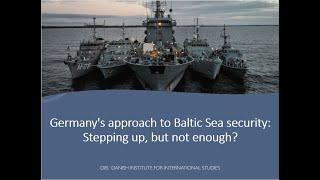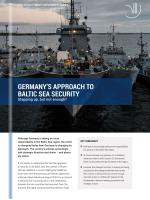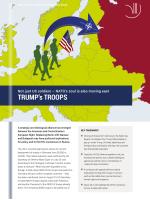Webinar
Germany's approach to Baltic Sea security: Stepping up, but not enough?

Watch recording of the webinar here
The changing security situation in the BSR has received a large amount of attention over the years. Within NATO and the EU, Berlin has taken part in multiple initiatives to address the rising tensions in the region, among others leading the multinational battalion battle group stationed in Lithuania as part of NATO’s enhanced Forward Presence (eFP), and the creation of PESCO to enhance the EU-member states defense capabilities, as well as the creation of the Maritime Forces Staff in Rostock that should develop into the multinational Baltic Maritime Component Command by 2025. Yet, at the same time Berlin has stressed the importance of maintaining dialogue with Russia and Germany continues to support the North Stream 2 pipeline project, despite sustained criticism and sanctions from the United States and other states. And recent developments such as the US President Trump’s decision withdraw almost 12.000 US troops from Germany and the poisoning of the Russian opposition politician Alexei Navalny add further tension.
Germany is taking more responsibility in the BSR, with the country’s approach to the region being closely connected to the changing international security context. A policy brief written by Amelie Theussen, assistant professor at the Center for War Studies, University of Southern Denmark, argues that Germany urgently needs to do even more: reform the Bundeswehr, decision-making processes, and strategic culture. A tall order - why is that necessary and is that at all possible?
Speakers
Jakob Henius, Defence Attaché, Danish Embassy in Berlin
Kai Prozeske, Defence Attaché, German Embassy in Copenhagen
Barbara Kunz, Senior Researcher, Institute for Peace Research and Security Policy, University of Hamburg
Amelie Theussen, Assistant Professor, University of Southern Denmark
Mikkel Runge Olesen, Senior Researcher, DIIS
Programme
14.00-14.15 Introduction, Mikkel Runge Olesen & Amelie Theussen
14.15-14.25 Reflections on the development of the German approach to security in the BSR, Kai Prozeske
14.25-14.35 Reflections on the Danish perception of Germany’s role in the BSR, Jakob Henius
14.35-14.45 The connection of the German engagement in the Baltic Sea region to the wider issues of European security and what is needed for the future, Barbara Kunz
14.45-15.30 Q & A - moderated by Amelie Theussen
Practical information
The seminar will be in English. Participation is free of charge, but registration is required.
Sign up
DIIS Experts





